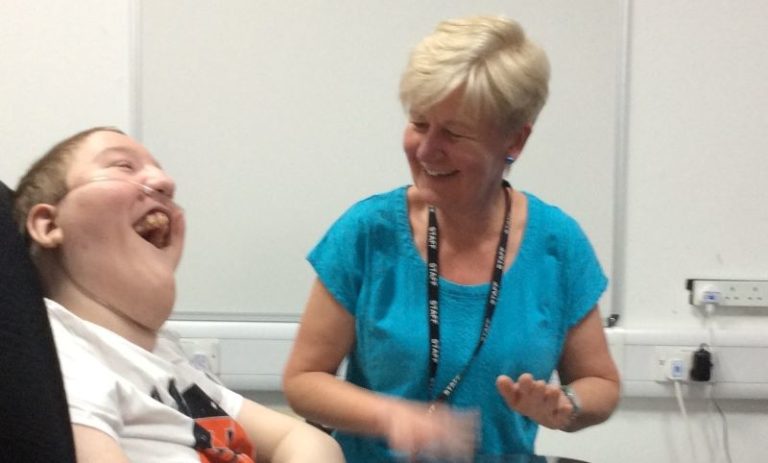Mikey is a student for whom music therapy is a crucial part, and probably the highlight, of his school week. I have worked with him for many years, seeing him each week at school for an individual session. He has complex health needs and, since he does not communicate verbally, music is a vital means of communication for him.
The main aims of his sessions are to develop our relationship, by encouraging him to interact with me through music; to encourage him to use a variety of musical instruments and electronic devices to create music, as a means of expressing himself; to develop his vocalising, and to provide opportunities for him to listen and focus his attention for extended periods.
From his very first session, the windchimes on a stand have been a favourite instrument and continues to feature in most sessions. He plays the chimes with his feet, using them very creatively to express how he’s feeling (he can play both very delicately and very loudly!) and interacting with me on whatever instrument I am playing. Recently he’s been keen to play the lap-top snare drum (as pictured above). When he’s making music on the iPad, he creates a wide range of styles and textures from single notes to big clusters of notes interspersed with purposeful pauses. He interacts playfully with me and finds it amusing when we imitate each other.
I encourage Mikey to vocalise in sessions by vocalising myself, and by placing a microphone by his mouth to amplify his sounds; he works hard to use his voice this way. He responds to my voice usually with single vocal sounds, and often with giggles too.
His quality of listening and concentration throughout each session has developed considerably. He now listens intently to my playing the recorder, makes intense eye contact when I’m close to him and follows me with his eyes as I move around him. He is also fascinated with the swanee whistle – he watches me attentively when I’m playing, and finds it very funny! I’m amazed that he is able to sustain concentration for such long periods – usually more than 30 minutes – when concentration in other areas often seems difficult for him. Music definitely seems to be his passion!
I believe that using music is a most important way for Mikey to communicate and express his feelings, and is also a medium that he loves. He is so full of energy and enthusiasm – he is a joy to work with.
– Julia Dunn, Senior Music Therapist

